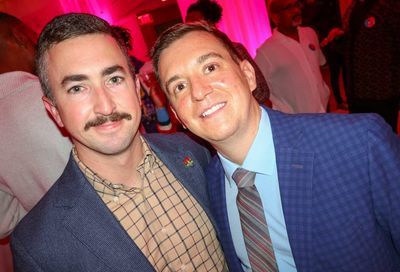Marriage Going Mainstream
News Analysis: Two men or two women marrying is not the shock that it once was, and the view is starting to spread across the nation on several significant levels
When the Defense of Marriage Act (DOMA) was signed into law in the heat of the 1996 campaign season, support for marriage equality stood at only one in every three people in Massachusetts. Despite that, both of the state’s members of the U.S. Senate, Ted Kennedy and John Kerry, voted against the bill.
Only California, Hawaii and Illinois – all with lower levels of support for marriage equality at the time – joined Massachusetts in having both of the state’s senators oppose the bill.
Today, according to an article by three professors at Columbia University published in The New York Times on Aug. 20, support for marriage equality is now at 62 percent in Massachusetts and – in the state with the lowest support of those four double-”no” vote states – has reached 48 percent in Illinois, an increase of 22 percent since DOMA’s passage.
Nationwide, a CNN poll released this month showed, for the first time, that a majority of the country supports marriage equality. Even in a double-”yes” DOMA vote state such as Texas, support has jumped 11 percent over the past 15 years, according to the professors’ analysis, to 35 percent.
This change among the population at large is not the only place in which this result – of which the professors in The New York Times wrote, ”perhaps the public has reached a turning point” – is being seen this year.
In the past 90 days preceding Aug. 25, a Lexis-Nexis search for discussion of the proposed Federal Marriage Amendment, which would ban marriage equality in the Constitution, turns up only 13 results – one of which comes from the Christian Newswire and two of which come from the conservative Human Events Online. To compare, the same 90 days in 2006 – the most recent non-presidential congressional election year – included 406 results for the same search. In the same period during the 2008 presidential campaign, there were 73 results for the search.
The fact is that – despite a federal court ruling in Massachusetts striking down Section 3 of DOMA and another federal court ruling striking down California’s Proposition 8 – politicians just aren’t focused on even grandstanding in support of the previously considered Federal Marriage Amendment anymore.
On Aug. 20, Politico‘s Jonathan Martin and Ben Smith reached a similar conclusion, writing that ”battles over morality-based cultural issues such as gay rights, abortion and illegal drugs that did so much to drive the conservative movement and dominated the political conversation for more than 30 years have abated.”
Although the Politico article went on to consider other targets of conservative ire today, the fact remains that the public – and the politicians – appear to have reached a turning point in the public debate over marriage.
A final way in which this turning point has been apparent this summer is the response to the National Organization for Marriage’s ”Summer for Marriage” tour. Far from energizing communities to oppose ”gay marriage,” the near-universal result, in city after city, was a far more engaged and motivated pro-marriage equality counter-action that often drew more people.
That response, then, impacted the message in media reports from Minneapolis – ”Dueling rallies with little hitch,” headlined the Star Tribune – to Atlanta, where The Atlanta Journal-Constitution noted that NOM had ”20 or so protesters” compared to ”more than 150 counter-protesters.”
”The press would emphasize the imbalance in the numbers, [NOM President Brian] Brown said,” the report added.
This ”Summer for Marriage” – contrary to Brown’s aim and closer to the professors’ point – has been significant, but not just for the numbers at the rallies. It has provided significant evidence among hard-core activists, politicians and the population at large that a turning point has indeed been reached.
As the professors wrote in The New York Times piece, the issue is by no means settled and done, but this summer has suggested across the board that the debate has shifted and that the scales have tipped.
Support Metro Weekly’s Journalism
These are challenging times for news organizations. And yet it’s crucial we stay active and provide vital resources and information to both our local readers and the world. So won’t you please take a moment and consider supporting Metro Weekly with a membership? For as little as $5 a month, you can help ensure Metro Weekly magazine and MetroWeekly.com remain free, viable resources as we provide the best, most diverse, culturally-resonant LGBTQ coverage in both the D.C. region and around the world. Memberships come with exclusive perks and discounts, your own personal digital delivery of each week’s magazine (and an archive), access to our Member's Lounge when it launches this fall, and exclusive members-only items like Metro Weekly Membership Mugs and Tote Bags! Check out all our membership levels here and please join us today!





















